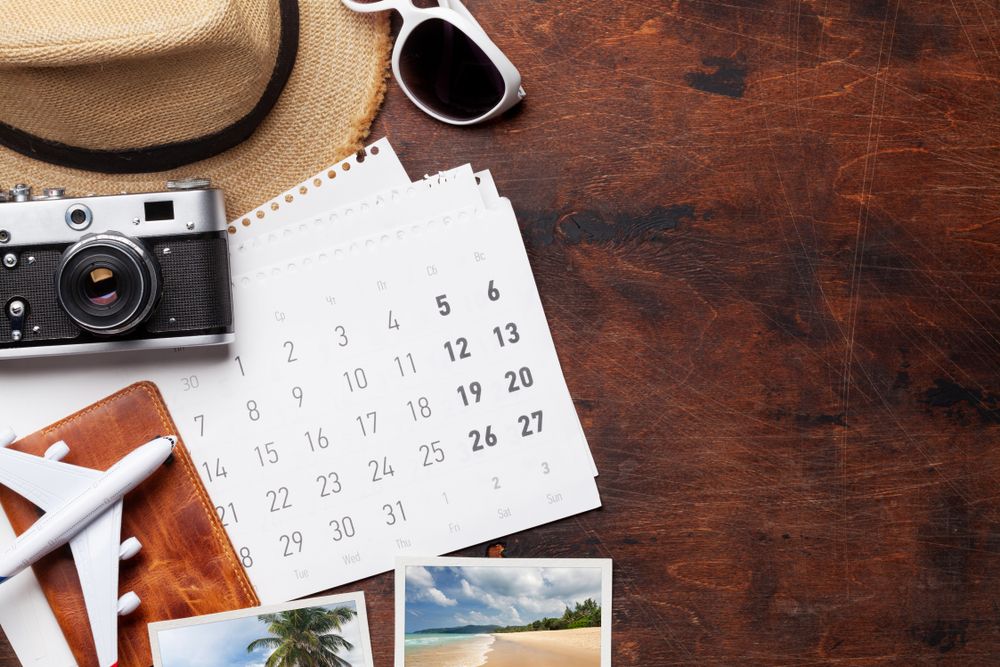Traveling doesn’t have to break the bank, and one of the simplest ways to save is by being flexible with your travel dates. Airlines and hotels base their prices on demand, meaning costs can vary significantly depending on when you book and when you travel. By shifting your dates even slightly, you can take advantage of lower prices, avoid peak travel surcharges, and find better deals. Here’s why having flexible travel dates can save you hundreds of dollars.
1. Capitalize on Midweek Travel Discounts
Traveling on weekdays, especially on Tuesdays and Wednesdays, often costs less than flying on weekends when demand is higher. Most people prefer to travel on Fridays or Saturdays and return on Sundays, leading to higher prices during these times.
Benefits of Midweek Travel:
- Lower Flight Costs: Airlines typically offer lower prices on less popular travel days, allowing you to save money just by shifting your trip by a day or two.
- Less Crowded Airports: Midweek flights often mean shorter lines and less crowded terminals, making for a more relaxed travel experience.
- Better Accommodation Rates: Many hotels also lower their rates on weekdays when demand drops, making it easier to snag a good deal.
By opting for midweek flights and hotel stays, you can avoid peak prices and enjoy a more comfortable travel experience.
2. Take Advantage of Shoulder Seasons
Shoulder seasons, the periods right before and after peak travel season, offer many of the same perks as high season but at a fraction of the cost. For example, traveling to Europe in late spring or early fall often costs less than summer, while still offering great weather and plenty of activities.
Why Shoulder Seasons Are Ideal:
- Lower Accommodation and Flight Prices: Demand for flights and hotels is lower, allowing you to find deals that would be harder to get during peak season.
- Less Crowded Attractions: With fewer tourists around, you can enjoy popular sites and activities without the crowds.
- Milder Weather: Shoulder season weather is often pleasant, making it comfortable for sightseeing and outdoor activities.
Planning your trip around shoulder seasons gives you the best of both worlds: affordable rates and a more relaxed travel environment.
3. Leverage Fare Comparison Tools with Flexible Dates
Most airfare comparison tools, like Google Flights, Skyscanner, and Kayak, offer a “flexible dates” feature, allowing you to search for the cheapest travel days within a month. By using these tools, you can easily spot lower fares and pick dates that maximize your savings.
How Fare Comparison Tools Help:
- See Prices Across an Entire Month: Search for flights across a full month to identify the cheapest days to travel.
- Receive Price Drop Alerts: Set alerts for when prices fall for your preferred destinations, making it easy to book at the lowest price.
- Find Nearby Airports: Some tools allow you to compare prices for nearby airports, which may offer lower fares than your first choice.
These tools make it simple to visualize your options and choose dates that offer the best value, potentially saving hundreds on airfare alone.
4. Avoid High-Season and Holiday Surges
Peak travel seasons and holidays, like Christmas, Thanksgiving, and summer vacations, are generally more expensive due to high demand. Traveling a few days before or after these peak times can help you avoid premium pricing.
Benefits of Avoiding High-Season Travel:
- Avoid Premium Pricing: Airlines and hotels increase prices significantly around popular holidays and peak travel periods.
- Enjoy More Affordable Attractions: In high season, not only are flights and hotels pricier, but popular attractions may also raise prices. Avoiding these periods can save you on both travel and entertainment costs.
- More Availability: During peak season, options for accommodations and activities may be limited, and prices for remaining options are typically higher.
By being flexible with your travel dates, you can avoid these high-season surges, allowing you to travel during less busy times at a fraction of the cost.

5. Book Last-Minute Deals or Plan Ahead for Early Bird Discounts
Being flexible with your travel dates allows you to take advantage of both last-minute deals and early bird discounts. Airlines and hotels often reduce rates close to the travel date to fill seats and rooms, while booking well in advance can also yield significant savings.
Benefits of Last-Minute or Early Bookings:
- Score Last-Minute Discounts: If you’re flexible and can leave at short notice, you can find last-minute deals on flights, hotels, and vacation packages.
- Get Early Bird Discounts: For those who prefer to plan ahead, booking early can lock in lower prices before demand picks up.
- Access to Exclusive Offers: Some travel websites and apps offer flash sales or limited-time discounts for those willing to book within a short time frame.
Whether you prefer planning ahead or are open to spontaneous trips, flexibility with travel dates gives you access to a range of discounts that wouldn’t be available otherwise.
6. Extend Weekend Trips to Include Cheaper Days
If you’re planning a weekend getaway, extending your stay to include a Monday or Tuesday can often bring down the cost of your flights. Many people fly back on Sundays, creating high demand and raising prices. By extending your trip by just one or two days, you can find lower fares and enjoy a less crowded travel experience.
Advantages of Extending Weekend Trips:
- Cheaper Return Flights: Flying home on Monday or Tuesday can be significantly cheaper than Sunday, allowing you to avoid weekend surcharges.
- More Affordable Hotel Stays: Many hotels reduce rates on weekdays, meaning an extended stay can be cheaper per night.
- Reduced Travel Stress: Airports are typically less crowded on Mondays and Tuesdays, making for a smoother travel experience.
Extending your trip can give you the same vacation experience while saving you money on flights and accommodations.
7. Take Advantage of Flexible Hotel Booking Policies
Many hotels now offer flexible booking policies, allowing you to book now and adjust your dates without penalties. This flexibility is especially helpful if you’re trying to lock in a deal but aren’t certain of your exact travel dates.
How Flexible Hotel Booking Policies Save You Money:
- Lock in Lower Rates: If you spot a good rate, book it immediately. Then, if your plans change, adjust your dates without additional fees.
- Monitor for Price Drops: After booking, you can keep an eye out for price drops on your desired dates and rebook if you find a lower rate.
- Book During Sales: Take advantage of hotel sales or promotions without worrying about exact dates, as you can modify your booking as your plans solidify.
With flexible policies, you can plan your trip early and lock in a great rate, giving you more freedom to adjust your travel dates as needed.
8. Find Deals Through “Flex Day” Fare Options
Many airlines offer “flex day” options, allowing you to compare prices over several days before and after your preferred travel dates. This feature makes it easy to find cheaper flights that fit within a general timeframe.
Benefits of Flex Day Fare Searches:
- Wider Range of Prices: Flex day fares often reveal a range of prices, showing you exactly how much you could save by shifting your dates.
- Seamless Booking Process: Most airline websites and apps now integrate flex day searches, making it simple to find the best option.
- Maximized Travel Budget: By selecting the cheapest days within a set range, you can save on flights and allocate that extra cash to other parts of your trip.
Using the “flex day” feature on airline booking sites can help you make informed decisions and choose dates that stretch your travel budget further.
9. Travel During Off-Peak Times of Day
Not only does the day of the week impact travel costs, but so does the time of day. Flights in the early morning or late at night tend to be cheaper because they’re less convenient for most travelers.
Advantages of Off-Peak Travel Times:
- Lower Flight Prices: Early morning or red-eye flights often come with lower fares because fewer people choose these times.
- Less Crowded Airports: Off-peak flights usually mean quieter terminals, shorter lines, and a less stressful experience.
- Faster Commute to and from Airports: Traveling outside peak hours can mean lighter traffic to and from the airport, potentially saving you time and money on transportation.
Opting for off-peak flights can make a big difference in your travel costs while also providing a calmer travel experience.
Flexibility with travel dates is one of the most effective ways to save money on flights, accommodations, and even entertainment. By adjusting your travel plans to avoid peak dates, leveraging price comparison tools, and choosing less popular days and times, you can unlock significant savings. Adopting a flexible approach to travel not only helps you keep costs down but also allows for a more relaxed and enjoyable trip, free from the crowds and stress of peak travel times. Whether you’re planning a weekend getaway or an international adventure, a flexible schedule can help you make the most of your travel budget and make memories without the extra expense.





